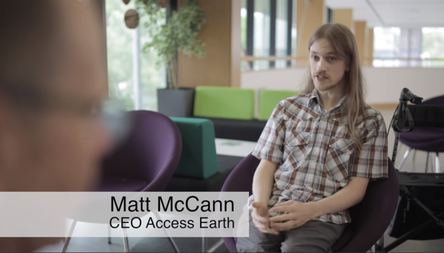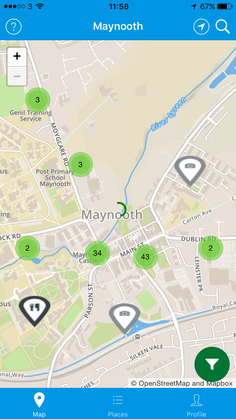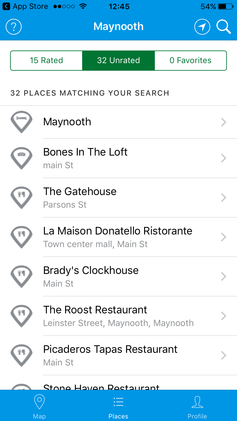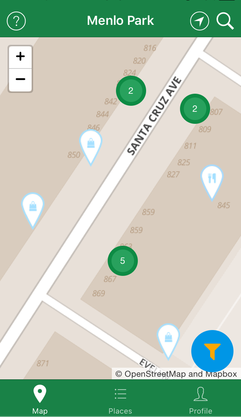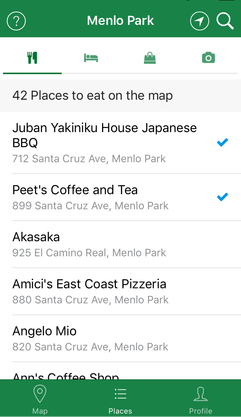We will attend as a partner of Access Earth, an Irish startup focused on accessibility. We began a research collaboration less than a year ago with the aim of taking forward our collective efforts to elevate the lives of people with disabilities.
So as we get ready to head to the UN, we are excited to share with you a detailed look into the research collaboration.
The story so far
Access Earth is a global Trip Advisor or Yelp for accessibility information. It allows users to rate businesses and public places like hotels, cafe and more, on their accessibility, and share relevant accessibility information.
Based out of Ireland, Access Earth's vision is to be the world's largest provider of accessibility information, enabling a population which is frequently left behind.
Access Earth began when it’s now founder, Matt McCann had an unpleasant travel experience in London. Matt has Cerebral Palsy and had carefully selected a hotel which mentioned that it could accommodate his wheelchair. Upon arrival, he found a series of problems, including steps at the entrance and narrow hallways which couldn’t fit his wheelchair or walker.
This experience was an eye opener for Matt, who realized that this was a day-to-day experience for those with similar accessibility needs.
Access Earth was therefore created with the goal of eliminating the fear of the unknown for those who have physical or cognitive disabilities and use mobility devices. Today, Access Earth has a web platform and an app for Android and iOS devices through which anyone can rate how accessible a public space is. The data collected helps people who have temporary or permanent accessibility needs, do day-to-day activities like get a coffee, travel, visit places or even go shopping.
Access Earth's efforts are widely recognized internationally and they are currently in the process of raising over 500,000 Euro to scale up their company.
Ada's and Access Earth partnership
Here at Ada’s, where the mission is to empower adults with disabilities through employment, we have been a strong supporter of efforts which call for inclusiveness. Access Earth was therefore an obvious partner, with overlapping goals and vision.
Ada’s collaborated with Access Earth to conduct explorative research on the needs of the community of adults with disabilities, focused user research to develop Access Earth’s app and define the road ahead for the product development.
Our research collaboration began by defining the target user. We surveyed people with
1) Physical disabilities
2) Developmental and cognitive disabilities
3) Primary caregivers
In addition to these three groups, we also spoke to designers, app developers and people without disabilities to get their feedback on the the app.
We conducted research using one-on-one interviews and usability tests. Recruitment for the research was done at Ada’s with our employees and through friends and family networks.
The first phase of research began by getting feedback for the existing version of the app at the time. Feedback was collected from a wide demographic consisting of people with and without disabilities or accessibility needs.
Some findings here pointed to issues in navigation, clarity of instruction and user journey from the time of signing up to rating a place.
A substantial part of the research also focused on understanding the lives of the users holistically. At this stage, several employees at Ada’s were interviewed and their stories were critical in understanding the invisible challenges they face.
The employees at Ada’s shared with us their everyday experiences around mobility and independence. It became very clear that the lack of opportunities to be mobile, has a direct effect on the psychological well being of a person.
Another type of insight came from primary caregivers. Caregivers often end up deciding where and when someone in their care can go. With their feedback, we added directions to places and the ability to book a cab with wheelchair access through Uber within the app.
The second phase of research was conducted after several changes were made to the existing version of the app at the time. This time around, we focused on sharpening features and on identifying bugs and errors.
The final stage of research was conducted via usability tests with the latest version of the app. Experts in the field of design were consulted to give feedback of specifics like icons and typography.
This phase of research indicated that while features were refined and users were happy to use the app, there was a need to streamline design elements on the app.
Findings
While there were several insights, here are a few of the selected findings:
- With the app, several pain points in the lives of people with disabilities are addressed (Availability of accessibility information, freedom of movement, decision making and so on)
- By addressing the needs of caregivers, people with disabilities are further empowered
- Users indicated that if they had more data on accessible places, they are more likely to try new places
- The information on the app needed to be presented in a simple way, with less content and more icons
- Most requested features included, directions to a place, written reviews, booking accessible cabs and contact information for places
Here are some quotes from users during interviews and usability sessions:
" I don't usually go out for dinner with my family. It can be uncomfortable and difficult. Maybe if my parents had this app we could find restaurants closer to our home where we can check information before leaving the house."
- Ada’s employee with cognitive disability living at home with his parents
" When my grandparents visit, we end up going to the same restaurants because we know that we can park in front of the restaurant and there's enough space to accommodate my grandmothers stroller. We would definitely like to go to more places when my grandparents visit, but we don't really know of other options which are accessible and have great food."
- User talking about problems faced when her grandparents visit
"It will be nice to have easy access to information about where I can grab a bite to eat, know that I don't have to climb steps and get more relevant information like directions”
- Adult with temporary mobility needs, due to knee surgery
"The biggest issue I face as a mother of a child with disability, is the lack of information about activities I can do with my daughter, which will expose her to new experiences. With Access Earth, I feel confident taking my daughter to museums and cafes, knowing that she will feel safe and comfortable. This is a huge resource for parents who usually have to rely on word of mouth reviews before going to any public place."
- Mother of a teenager with cerebral palsy
Access Earth’s efforts are commendable because they have a direct effect on the mobility of a vast group of people and also signal to other organizations that it is profitable to be inclusive. According to the World Bank, 15% of the world's’ population has some form of disability. And, this population ends up spending around $13.6 Billion on travel every year.
The research process has been successful for creating a partnership which has global impact. We hope that this type of collaboration signals to other organizations, the importance of working together and the chain effects it can have.
We are extremely excited to attend The Zero Project Conference with Access Earth. Our collaboration across two countries, has helped create a product which caters both to the needs and the gaps for people with disabilities.
To learn more about how we conducted the research and get details on the findings or to collaborate with us, please write to us at [email protected]

